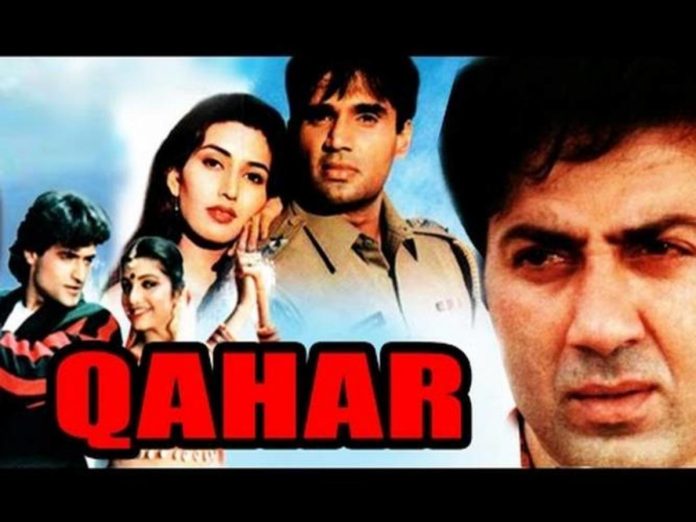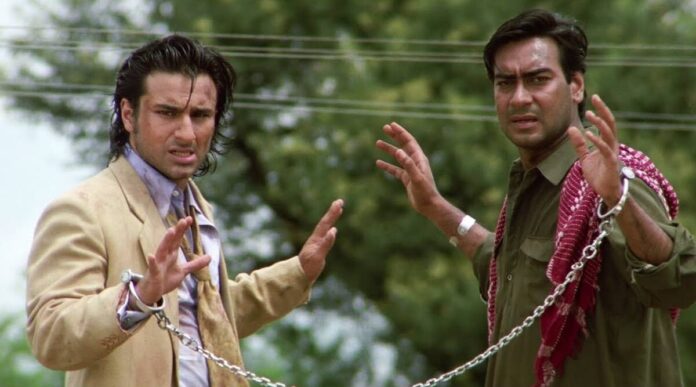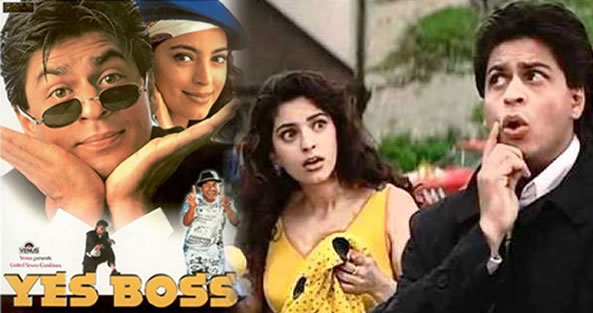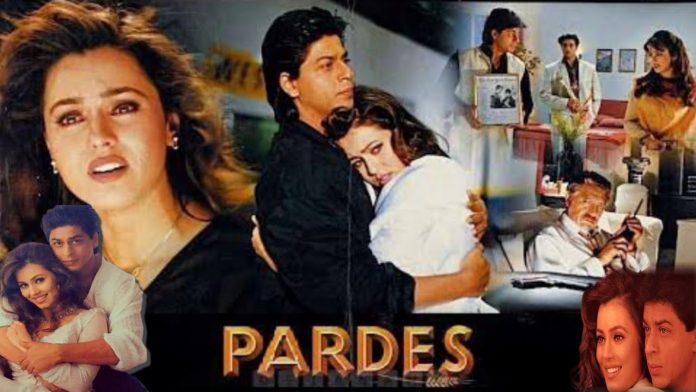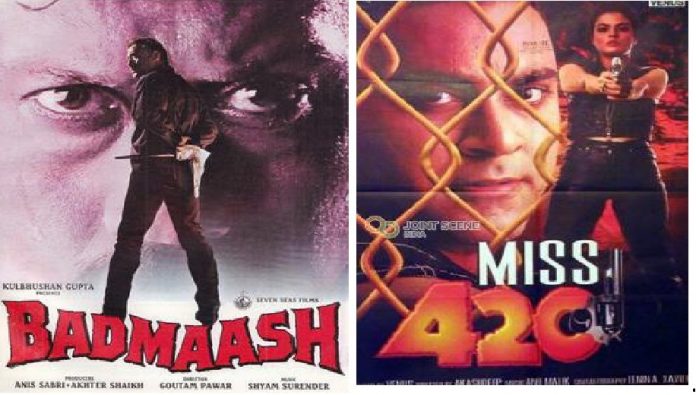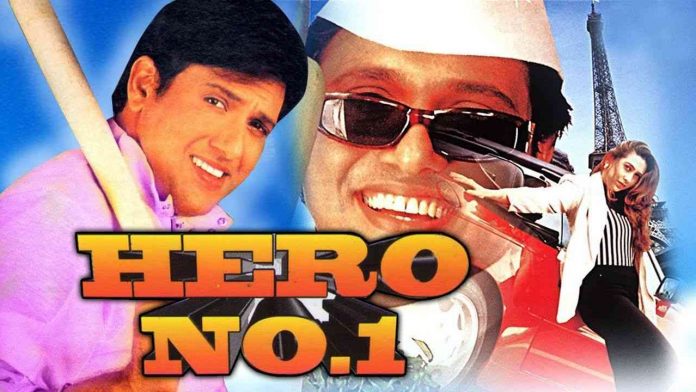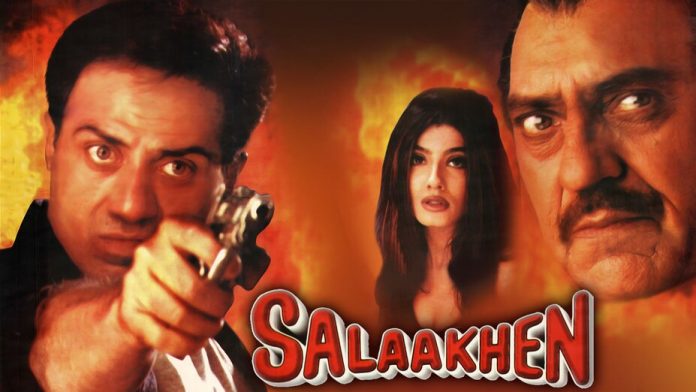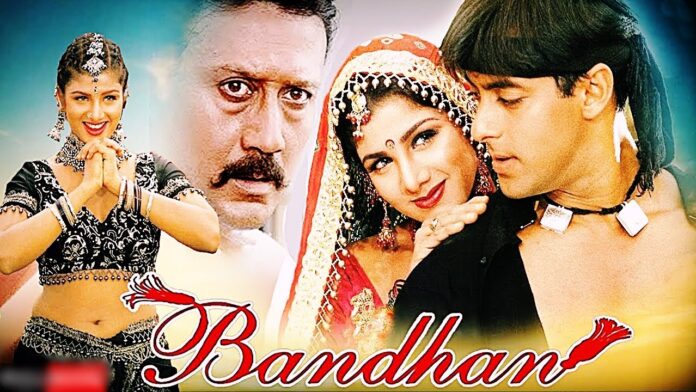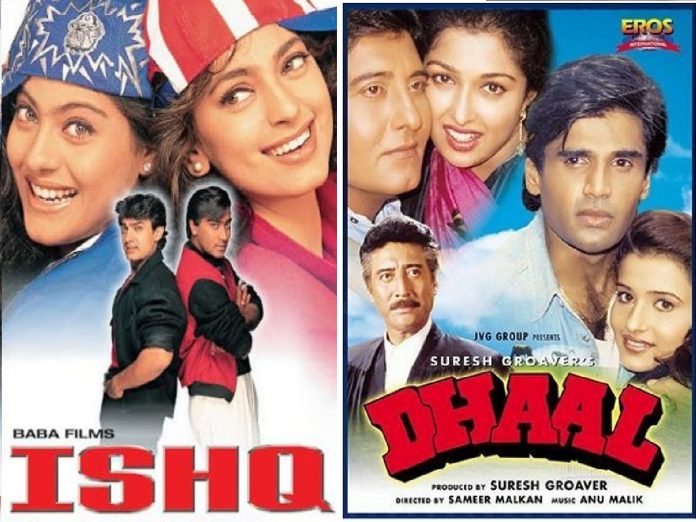BADMAASH
Seven Seas Films’ Badmaash (A) is a gang war film with a routine story. A brave, unemployed young man saves a college girl from being molested by the son of a small-time don and beats him up. The don takes this as an insult and seeks revenge. In the meantime, the young man and his friends form a gang of their own to face the don’s challenge. The don’s son rapes the young man’s sister and kills her. In retaliation, the young man kills the don’s son. Thereafter, the young man’s father and mother are also killed one by one. Ultimately, the don is exterminated.
The drama offers no novelty, and scenes have been seemingly written to accommodate action and violence. What’s more, in spite of having so much action, the makers have opted to avoid putting in some comedy for relief. Even the action scenes are mostly unexciting. Dialogues are ordinary. The film has taken many years to complete and that shows in continuity jerks.
Jackie Shroff goes through his role mechanically. Shilpa Shirodkar is fair. Paresh Rawal’s villainy is quite alright. Pran does a reasonable job. Bindu has done well. Ramesh Bhatkar, Vikram Gokhale, Dilip Dhawan, Shagufta Ali, Tej Sapru, Siddharth Ray, Sanjay Shah and Viju Kohte lend ordinary support. Pradeep Kumar and Jalal Agha, in special appearances, have just one scene each.
Direction is no better than the lacklustre script. Of the songs, ‘Aamchi Mumbai’ has some appeal for front-benchers. The other numbers are ordinary. Song picturisations are dull. Camerawork is not up to the mark. Production values are ordinary.
On the whole, Badmaash has taken a poor start and has nothing much to see a pick-up.
Released on 23-1-’98 at Novelty and 14 other cinemas of Bombay thru Dilsa Distributors Combine. Publicity: good. Opening: poor. …….Also released all over.
MISS 420
Venus’ Miss 420 (UA) is a romantic suspense thriller. The intelligence department of the CBI puts a young spy, Miss 420, on the job to trap the people involved in smuggling defence documents to foreign countries. The department chief senses the involvement of its own officers too. The drama starts with a car being blown up in a bomb explosion by the smugglers to kill Miss 420. They are shocked when they see a similar-looking girl who comes alongwith her lover, in search of her brother who is an investigative journalist. There are several turns and twists thereafter and finally, a climax full of action. Almost three-fourths of the film moves on the romantic track and hardly impresses with its songs and dances. The songs are good and their picturisations, sensual, but they were popular several years ago. Even while the suspense keeps on increasing, the real excitement comes towards and in the climax. Dialogues are ordinary.
Sheeba lends glamour by exposing freely. She is fair as far as acting goes. Baba Sehgal is not impressive. He looks old too. Mohan Joshi does very well. Shakti Kapoor is good and so also Tinnu Anand. Asif Sheikh leaves a mark. Jeet Upendra, Mahesh Anand, Mushtaq Khan, Aroon Bakshi, Goga Kapoor, Anant Mahadevan, Ajit Vachani, Amita Nangia, Shubha Khote, Kuldeep Pawar and Abhimanyyu fill the bill. Johny Lever entertains in a couple of scenes.
Akashdeep’s direction is fairly nice. At least three songs — ‘Aaja meri gaadi mein baith jaa’, ‘Mesmsaab O memsaab’ and ‘Dhak dhak’ — are beautifully tuned but they’ve become stale now. Camerawork is good while the other technical aspects are alright.
On the whole, although it has a good suspense track, Miss 420 lacks in face value and substantive drama and will, therefore, find the going tough.
Released on 23-1-’98 at Maratha Mandir and 6 other cinemas of Bombay by Venus thru Shringar Films. Publicity: fair. Opening: poor. …….Also released all over.
UPHAAR TRAGEDY ACCUSED SUMMONED
CBI special magistrate Brijesh Sethi has taken cognisance of the offences under different sections of the Indian Penal Code in the Uphaar cinema tragedy case in Delhi and has summoned all the accused to his court on 16th February. Eight government officials and six persons of Uphaar cinema have been chargesheeted under sections 304A (causing death by negligence) and 304.
VINOD SHARMA ELECTED RAPA PRESIDENT
Vinod Sharma was elected president of the Radio & TV Advertising Practitioners’ Association of India Ltd. (RAPA) for 1997-98 at its annual general meeting held recently in Bombay. Brij Mittle was elected vice president, Ashok Vaishnavi, hon. secretary, and K.N. Goel, hon. treasurer. Besides the above, Ameen Sayani, Amar Thakur, Madhu Srivastava, Purush Baokar, Rajendra Joshi, Shashi Surendranath, Suren Chawla and Vinod Ganatra were elected members of the managing council.
FIRE DESTROYS CENTRAL CINEMA
Central Plaza cinema at Girgaum, Bombay, was gutted in the early morning hours of 21st January. While the cinema and the furniture were badly damaged in the fire that broke out around 5 a.m., the projection room and the air-conditioning plant of the cinema, which are behind the auditorium, are intact. The police and the fire brigade do not think, it is a case of sabotage or short circuit.
Contract labourers had cleaned up the cinema as usual on 20th night after the last show of Police Story 2. They shut all the exits and left around 4 a.m. Some employees, who were sleeping outside the auditorium, were woken up by the smoke around 5 a.m. The fire brigade was summoned and the fire doused in about 20 minutes. No casualties were reported.
The cinema is owned by Pranlal Doshi who had acquired it from K.M. Modi in 1968. It was built in 1918. It had been renovated by Doshi just two years ago. The cinema was known for screening Marathi films once upon a time. Years ago, it used to screen top Hindi films. Then came a bad patch. Of late, the cinema had started screening English films in regular and late-night shows too. The cinema was originally called Central and it was rechristened Central Plaza only some time back.
UMESH MEHRA’S DAUGHTER TO WED
Nishita, daughter of director Umesh Mehra and grand-daughter of producer F.C. Mehra, will wed Pushkar on 6th February at the Royal Western India Turf Club, Mahalaxmi, Bombay.
WEDDING BELLS FOR J.P. CHOWKSEY’S SON
C.I. distributor Aditya Chowksey, son of J.P. Chowksey, will wed Chhavi on 3rd February in Indore at Sayaji Hotel.
SUBHASH GHAI’S TRIPLE CELEBRATIONS
Subhash Ghai will host a luncheon party on 25th January at Royal Palms to celebrate three occasions: silver jubilee of Pardes, his birthday (on 24th January) and the announcement of his new film.
VINOD KHANNA TO CONTEST LS ELECTION
Vinod Khanna will contest the Lok Sabha elections on a BJP ticket, from the Gurdaspur constituency in Punjab. His candidature was finalised and announced by the Bharatiya Janata Party on 22nd January. He is pitted against former Union minister Sukhbans Kaur.
Vinod flew to Delhi on 22nd morning.
KALYANJI, ANANDJI, MAVJIBHAI BEREAVED
Hansbai Virji Shah, mother of Bombay distributor Mavjibhai Shah and music directors Kalyanji, Anandji and Babla, expired on the morning of 23rd January. She was 92.
Chautha will be held on Sunday, 25th January, from 3 p.m. to 5 p.m. at Karsan Laddhu Hall, Dadar, Bombay.
CENSOR NEWS
Vicky Films Pvt. Ltd.’s Zor (length 4534.08 metres in 17 reels), applied on 19th and seen on 21st, has been offered A certificate, with many cuts.
Sapna Arts’ Banarasi Babu (length 3790.80 metres in 16 reels), applied on 19th and seen on 22nd, has been okayed for UA, with minor cuts. Certificate will be issued soon.
Mark Films International’s Vinashak was given C.C. No. CIL/3/3/98 (A) dt. 20-1-’98; length 4386.51 metres in 15 reels (cuts: 51.24 metres).
Om Films’ 2001, applied on 16th and seen on 20th, has been issued C.C. No. CIL3/6/98 (A) dt. 22-1-’98; length 4423.96 metres in 17 reels (cuts: 39.04 metres).
Damani Pictures P. Ltd.’s Saazish was given C.C. No. CIL/2/3/98 (UA) dt. 20-1-’98; length 3949.75 metres in 16 reels (cuts: 330.19 metres).
Seven Seas Films’ Badmaash was given C.C. No. CIL/3/4/98 (A) dt. 20-1-’98; length 3446.14 metres in 14 reels (cuts: 108.86 metres).
Mirabai Films P. Ltd.’s Kama Sutra – A Tale Of Love (dubbed), cleared vide Bombay high court order dt. 23-12-’97, has been issued C.C. No. CIL/3/5/98 (A) dt. 21-1-’98; length 3043.88 metres in 7 reels (some deletion in sound only).
YOU ASKED IT
The first month of the new year has been quite disastrous for the industry. Will that be a bad omen?
– Don’t you worry. Things will definitely begin to look up from 30th January. So, cheer up and forget about the bad omen.
Has Jeans (dubbed) been sold for any territories so far?
– Tolu Bajaj, who has the all-India rights of the film, will himself release it in Bombay, Delhi-U.P. and Nizam. Business for the other circuits will be done now. The film’s shooting is complete, and Hindi dubbing will start shortly.
Why do people generally avoid seeing films during election campaigning time?
– People generally prefer to see, talk about and listen to politicians during the one-two months of election campaigning. At places, people avoid frequenting cinemas for fear of tension due to party rivalries. Then, there are also election meetings to be attended.
SIGNED
Priya Gill In ‘Josh’
Priya Gill has been signed opposite Shah Rukh Khan in United Seven Creations’ Josh, being produced by Ganesh Jain, directed by Mansoor Khan and presented by Venus. Others in the cast are Aishwarya Rai, Chandrachur Singh, Sharad Kapoor and Sharat Saxena.
Veeru Devgan Signs Amitabh For Next
Amitabh Bachchan and Veeru Devgan will be together once again in Devgan Arts’ Prod. No. 2. Other cast and credits are under finalisation.
IN & OUT OF BOMBAY
Producer-director Subhash Ghai and Mr. Tolu Bajaj of Metro Films, Bombay, returned from Madras on 23rd January.
Mr. Nanubhai Desani of Vaishali cinema, Bhavnagar, staying at Sahara Hotel (386-1491), will return to Bhavnagar tomorrow (25th January).
MIX MASALA
AWARD KI PUKAAR
It was a lucky flight that brought Anil Kapoor and Madhuri Dixit from Hyderabad to Bombay to attend the Screen Videocon awards function on 17th January. For, both of them won the best acting awards. The two were shooting in Hyderabad for Boney Kapoor’s Pukaar and came to Bombay for a day, only to attend the awards nite.
IDOL CHAT
Of the 25 contenders for the Femina Miss India title due to be conferred shortly, at least three have film personalities as their idols. Twenty-one-year-old Vithika iodlises Sunil Dutt and Sarojini Naidu. Jaspreet, who is 22 years old, says, Shabana Azmi is her idol. And for 21-year-old Smriti, her grandfather and Shah Rukh Khan are her two idols.
DO YOU KNOW?
* Real Image, the DTS frachisees in India, got a shot in the arm when the first DTS film in India, KARUPU ROJA (Tamil), bagged the best sound recordist award for Sridhar in the Tamil Nadu State Film awards announced recently in Madras. Kamal Haasan’s Tamil hit, INDIAN, another DTS film, bagged the award for the best film.
* Bappi Lahiri was the first music director to record a song at Mehboob Recording Theatre when it opened in 1972. The song was for CHALTE CHALTE. On 19th January, 1998, the fully renovated (with new recording machinery) Mehboob was inaugurated, again by Bappi Lahiri who, this time, recorded a song for TUMSE PYAR HO GAYA. Indeed, Mehboob se pyar ho gaya!
* SHAPATH has yielded a distributor’s share of about 1,70,000/- in 4 weeks from Saroj, Amravati. This is better than the shares of films like AFLATOON, DHAAL and QAHAR from Amravati city.
‘Banarasi Babu’ Shrouded In Controversy
As if the several years it has taken in the making wasn’t enough, Nandu Tolani’s Banarasi Babu is in the midst of a controversy even a week before its scheduled release on 30th January.
The film’s West Bengal distributors, PMD Entertainments (P.) Ltd., have obtained a stay order (dated 23rd January) from the Bombay high court, restraining Filmcenter from delivering the prints of the film for West Bengal circuit to anybody except themselves. The film was originally registered in the name of Sapna Film Distributors. PMD Entertainments acquired it on 22nd December, and Sapna Film Distributors accordingly wrote to the EIMPA, asking it to de-register the film from its name. The communication to the EIMPA mentioned that the arrangement was irrevocable.
However, when Zor was postponed, Nandu Tolani (partner in Sapna Film Distributors with Amar Pandey) decided to release Banarasi Babu himself in West Bengal and, accordingly, asked the EIMPA to ignore the ‘irrevocable’ arrangement.
Fearing problems, PMD Entertainments moved the court and succeeded in obtaining the injunction order. According to Bipin Savla, representative of PMD Entertainments, “It’s sad that Nandu Tolani is behaving this way. I bailed him out of so many difficulties after PMD acquired the film for West Bengal. Kader Khan had not been paid a single naya paisa and he refused to complete his work on the last day of shooting unless he was paid. He also refused to dub till his further dues were cleared. I paid him for completing shooting and gave an undertaking for further payment before he commenced dubbing. Why, I also paid for the sound negative and for clearing several liabilities of Nandu earlier this month. And Nandu forgot all this no sooner was Zor postponed. Obviously, he was acting on the instructions of some vicious mind.”
‘Kama Sutra’ Censorship
CBFC Ignorance Exposed
Mira Nair’s Kama Sutra (Hindi dubbed) was finally issued censor certificate on 21st January, 1998. The dubbed Tamil and Telugu versions must also have been likewise issued certificates. The three dubbed versions were cleared by the Bombay high court after a long legal battle.
The high court order dated 23rd December, 1997, is worth reading for several reasons. For one, it exposes the ignorance of one government department (Central Board of Film Certification) in matters relating to another government department (I & B ministry). Secondly, it also throws light on the vanity of the CBFC’s examining committee which was under the impression that it was above the I & B ministry and was not governed by its directions!
Although the two-judge bench of Justice B.P. Saraf and Justice A.Y. Sakhare did not say so in their 25-page order, a reading of the same makes one wonder whether CBFC chairman Shakti Samanta and Bombay’s regional officer Sanjeevani Kutty have any moral right to continue in office after such an order.
The gist of the case and the order is given hereinbelow:
Mira Nair’s company, Mirabai Films P. Ltd., filed a writ petition as they were aggrieved by the letters of the regional officer, CBFC, dated 13-10-’97 and 17-10-’97, directing them to delete certain visuals from the dubbed Hindi, Tamil and Telugu versions of Kama Sutra – A Tale Of Love. These directions, according to the petitioners, were illegal and contrary to the existing guidelines of the Central government. They contended that the CBFC had no power to further censor the visuals of the dubbed versions of an already certified film. The English (original) version of Kama Sutra – A Tale Of Love was certified (for adults) on 9th October, 1997. Even this had entailed a long legal battle but that’s not the point here.
When the petitioners submitted the dubbed versions to the CBFC, seeking ‘A’ certificate for them, in terms of the guidelines issued by the Central government regarding the procedure to be followed for certification of dubbed versions of already certified films, they (petitioners), opted that the dubbed versions should not be treated as fresh films and should be subjected to the special procedure laid down therein. According to the Central government guidelines (issued by the I & B ministry by D.O. letter of 10th June, 1993), an applicant in respect of a film claimed to be a dubbed version has been given an option to have his film treated as a fresh film or have his film subjected to the special procedure mentioned therein. The petitioners exercised the second option which clearly stipulates that once the examining committee by majority is satisfied that the dubbed version visuals are exactly the same as the visuals of the original version, there should not be another censorship in respect of visuals of the film except for the titles, credits cards etc.
But on receipt of the application, the CBFC again required the viewing of the dubbed film by the examining committee and later, by its letter dated 13th October, 1997, directed certain cuts in the visuals and dialogues of the Hindi version. By other letters dated 17-10-’97, certain cuts in the visuals and dialogues of the Tamil and Telugu versions were directed to be made. The petitioners complied with the directions of the CBFC as far as the cuts in the dialogues were concerned. But they were aggrieved by the CBFC directions for deletion of certain portions of the visuals in the dubbed versions because, according to them, there could not be any further censorship in the visuals of the dubbed film if they were exactly same as the visuals of the original version, about which there was no dispute. The writ petition was filed in so far as the directions pertained to the cuts in the visuals in the dubbed films.
CBFC regional officer Sanjeevani Kutty filed an affidavit on 21-11-’97 on behalf of the Union of India and the CBFC, the two respondents in the case. In para 14 of the said affidavit, it was stated that the guidelines of the Central government were executive instructions which were to be followed on a trial basis for six months. It was further stated that after six months, the procedure was to be reviewed and appropriate changes were to be made, it was also pointed out that the question of incorporating those executive instructions in the Cinematograph Certification Rules was under consideration of the Central government. It was further stated that even if they were so incorporated, they could not be applied retrospectively in case of the film of the petitioners.
Thereafter, vide an affidavit filed by an outsider, reference was made to the statement of the I & B minister to the effect that instructions had already been issued that visuals of dubbed films need not be re-certified and only dialogues would have to be examined by the examining committee. In support of the above contention, a copy of the communication dated 28-7-’97 from the joint secretary, government of India, ministry of I & B, addressed to FFI president K.G. Dossani, and various other documents were annexed to the affidavit. One of the documents so annexed was a copy of the record of discussion of the meeting of the I & B minister with representatives of the film industry, held on 15th July, 1997.
The court asked the counsel of the CBFC to tell them as to how on the face of these documents and the statement of the minister concerned, the CBFC could say that the guidelines/executive instructions, issued by the government on 10th June, 1993, were applicable only for a period of six months and were no more in force. The counsel told the court that CBFC was not aware of the above documents furnished by the petitioners (emphasis ours). In a further affidavit, filed by Sanjeevani Kutty on 16-12-’97, she explained that the documents referred to and relied upon by the petitioners were not in the possession of the CBFC when her earlier affidavit was filed. She, however, stated that the said documents had been confirmed by the ministry. It was, therefore, contended that since the CBFC was under the administration purview of the I & B ministry, it would not like to take a stand contrary to that of the ministry on that point.
But this was not the end of the matter. After the CBFC changed its stance, nothing should have survived in the writ petition. But the counsel of the CBFC submitted that in view of the above report of the examining committee, appropriate directions may be given by the court to the CBFC not to re-censor visuals of the dubbed films or, in the alternative, give it (CBFC) some time to enable it to modify the impugned letters. After time was allowed, the CBFC counsel told the court that the examining committee, appointed by the CBFC, did not agree to certify the dubbed films without the cuts in the visuals suggested by them despite the above directions of the Central government. The examining committee, it was added, felt that the executive instructions of the ministry, with its blanket prohibition on cuts in the visuals in dubbed films, restricted them from exercising their free opinion. The court asked the CBFC counsel to tell it as to how the examining committee could examine the visuals when the scope and ambit of its power was confined to the re-examination of the dialogues only. The counsel pleaded helplessness with respect to the wrong stance of the examining committee.
The court held that the examining committee was not correct in law in refusing to follow the guidelines issued by the Central government in respect of censorship of dubbed films. Section 5-B of the Act clearly empowers the Central government to issue such directions as it may think fit, setting out the principles to guide authority competent to grant certificate under the Act in sanctioning film for public exhibition. In the special procedure laid down for dubbed films, paragraph 5 clearly states: ‘The examining committee shall confine itself to censorship of the audio track (dialogue, lyrics etc.) in terms of the guidelines issued by the Central government for certification of film.’
Virendra V. Tulzapurkar with Virag V. Tulzapurkar, A. Deasi and C. Rana, instructed by M/s. Shah Desai Doijode & Phatarphekar appeared for Mirabai Films P. Ltd. R.V. Desai with Anoop V. Mohta appeared for the respondents.
FRUITFUL MEETING OF INDUSTRY, CABLE TV OPERATORS
The additional commissioner of police, North-West region, Bombay, Dr. Satya Pal Singh, on 15th January did for the industry what nobody has done so far. He organised a meeting of film personalities and cable TV operators, who have been at loggerheads over the issue of illegal screening of films on cable TV networks and in video parlours, at Otters Club, Bandra, Bombay.
Issues such as the above do not have readymade solutions, and the meeting in question assumes significance if only because a police officer of the rank of additional commissioner of police has (a) sympathetically heard the woes of the industry, (b) got two warring parties to meet and interact.
Yash Chopra, K.D. Shorey, Shyam Shroff (Bombay distributor), Kiran Shantaram, N.N. Sippy, U.A. Thadani (Bombay distributor-exhibitor), Sultan Ahmed, Ravi Chopra, Surinder Kapoor, Paresh Manjrekar (20th Century Fox), Ram Dayal, Gaurav Sharma, Ravi Reddy (raiding organisation) and C.L. Shukla (retired ACP) represented the film industry at the meeting. The cable TV operators, who attended the meeting, were Nadirali Jairaj, Kalpesh Shah and R.K. Mishra of 7 Star Satellite Network, Yogesh Shah, Ketan Kanakia, Avinash Batra, Dinesh Bhadarkar and Paresh Ashar of IN Cable Net, Ajay Patkar (Major Time Cable), S.E.B. Palanna (ICT Network), Ajit Rane (Aashish Vision), Paresh Thakkar (Rajesh Cable), Arvind Turbhe, Ravi Singh, Govind Ubhe, B. Raja and Sunil Thakur (of Siti Cable), Randeli Pereira, Rahul M. Patil, Virendra Pathak (Bhavani Cable), Pravin Patel (Space Vision), Jairam Palav (Bi TV), Ravi Agarwal (Rohit Vision), Rohinton Dadybujor (UCN-Space Vision), Aamir Gabaji, Mansoor Taiyabbhai (Super Cable TV), Brian D’souza and Suvarna.
DCPs of zones VII, IX and X and ACP and S.O. of North-West region were also present along with Dr. Satya Pal Singh.
At the outset, the addl. C.P. wecomed all the members of the film industry and cable TV operators for attending the meeting in response to the invitation from police. He explained the purpose of the meeting, saying that illegal screening of feature films was gross violation of the Copyright Act, causing tremendous loss to government revenue and also considerable loss to the film industry. The addl. C.P. further said that it was expected from the cable TV operators to present their views frankly about the truth in the allegations of the film industry and whether they wanted any change in the existing law. This is not only the problem of Bombay city but the entire country, he added. He explained that all had come together to discuss about the probable solutions.
K.D. Shorey began the meeting on behalf of the film industry. He said that normally, video rights were released after two weeks, and cable TV rights were released from the date of release of the film. He said that the amendment in copyright law came into force from June 1994 and the punishment is decided to the extent of minimum imprisonment for six months and fine of Rs. 50,000 for violation of copyrights. He explained the scope of Section 19 of the Copyright Act, that no right can be transferred unless it is in writing signed by the assignor or by his duly authorised agent. It is, therefore, compulsory for every cable TV operator to have copy of such assignment of copyrights, without which he should be prosecuted. The producer invests crores of rupees in the making of a film, and nobody has the right to exhibit it without copyrights, he explained.
Sultan Ahmed said that the Bombay high court had categorically defined home video rights, cable rights and satellite rights. He pointed out that he had sold the home video rights of his film but later on, the said film was also being shown on Cable TV. He quoted few instances of raiding the cable operators and appealed to the police to take stern action against infringement of the Copyright Act. He suggested that every cable TV operator may furnish the list of films to be shown in the next month, to the local police station so that assignment of copyrights could be found out.
Yash Chopra spoke about his Dil To Pagal Hai and appreciated the operation from the city police commissioner. However, he mentioned in dismany that after about 2½ weeks, DTPH was shown by cable operators. As many as eight cases were registered in Bombay, he said, but due to weak laws, the offenders continued showing DTPH. He also mentioned that there was no response from Ashok Hinduja of IN Cable Net. Chopra said that in spite of stern action, the violation continued, and the government was not serious about it. He, therefore, appealed to the cable operators to co-operate and stop violation of copyrights.
Yash Chopra proposed that a special cell to deal with copyright cases be formed for which the film industry was willing to share the expenditure.
N.N. Sippy bitterly pointed out that many theatres in Bombay had been demolished since the inception of Cable TV. He described the financial liabilities of a film producer and the rate of interest paid in the raising of funds for making a movie. He insisted that licences of cable TV operators committing violation of copyrights be cancelled and also appealed to them to not encourage such violation, else law would take its own course. He also supported the idea of formation of a special cell and assured that the film industry would bear the expenditure.
U.A. Thadani, president of the Theatre Owners’ Association, ruefully said that copyright violation was affecting the business of theatres the most. He pointed out that 46 cinemas had been demolished and only 106 cinemas were left in Bombay and if the violation of copyright continued with the present speed, there would be no cinemas left in the city.
Shyam Shroff pointed out that he had to withdraw his Chachi 420 early because it was released on 19th December and shown on cable networks on 22nd December and, therefore, collections fell down so much that he could not afford to pay the theatre rent.
Satish Kulkarni angrily said that if somebody picked a pocket, he was beaten up, but here, dacoity was being committed by cable TV operators and no action was taken. He lamented that dacoits had been invited in the meeting. The addl. C.P. admonished him and asked him to mind his language.
After the representations from the film industry were over, Atul Saraf from 7-Star Cable Network pointed out that there was no high gain in screening of new films, but this was happening due to unethical competition between the cable TV operators. He also pointed out that there were instances of extortion by private agencies working for copyright owners. The contentions of Saraf were further elaborated by his partner, Sudeshkumar Mishra. He said that some cable operators form a common control room for 100 to 150 points and some of them are promised free connections and showing of blue films, which attracts customers. He also pointed out that some big people, who have entered in the business, had applied all the tactics to finish small cable TV operators, which had ultimately put this competition on the wrong path of copyright infringement.
Jairam Palav of Bi TV also said that due to rivalry, the violation of copyright took place, and the raiding agencies were taking advantage of the situation. He suggested that sooner or later, cable industry would merge into the film industry and, therefore, a common association of film industry and cable operators could solve the problems.
Ketan Kanakia of IN Cable Net, which covers over 2,500 cable operators, said that the parent network had no control over its franchisees because a franchisee could insert a new channel without the knowledge of the parent network, and commit violation of copyright.
Arvind Turbhe of Siti Cable agreed that violation occurs due to competition and supported the idea of a common association.
Anilkumar Shravan of Feature Film Copyright Association clarified about the allegation of selective raids, saying that Siti Cable and IN Cable Net operators stopped the film whenever they telephoned the control room about the violation of copyright. Here, K.D. Shorey interrupted and said that such cable operators be arrested and prosecuted. It cannot be an excuse that the producer has not assigned the right. The most common allegation is that there are about 17 to 18 companies in operation for raiding cable TV operators and most of them ‘settle’ with the cable operators.
Yogesh Shah of IN Cable Net (Hindujas) said that the root cause was availability of the cassette, and he said that if the import of video cassettes could be stopped, controlling the violation of copyrights would be possible.
The addl. C.P. appreciated that the police had got an insight into the problem through this discussion. Police have also understood the grievances of both the sides, he added, but emphasised that there was no second opinion about illegal screening being a crime and where there was a crime, police was bound to take action. If somebody was violating the law and the other was following him, it is not justified at all, he explained. Without a gain, there cannot be competition and, therefore, there should be a common association of film industry and cable operators to smoothen the business in the interest of both the industries, he concluded.
The monthly programme of cable operators was jointly turned down by them on the ground that the schedule depends on availability of cassettes and hence it was not possible to furnish a schedule.
Shyam Shroff said that the list of persons raiding cable operators was already given to Social Service Branch, Crime Branch, C.I.D. etc.
The addl. C.P. frankly admitted that there were so many priorities before the police that this could not be a priority for them. However, in agreement with a suggestion to form a special cell, he opined that there could be a specialised agency with necessary expertise and more incentives for the staff working in the said cell. Here, K.D. Shorey said that there was an apex body on the national level, where it had been discussed and decided about the formation of a special cell. The addl. C.P. requested him to get the minutes of the said meeting for guidance and to submit to seniors in the department to consider it.
The addl. C.P. further said that the problem was really serious but the police had no control over law and judicial proceedings. He, therefore, appealed to the film industry being equipped with money power and media, to mould the minds of people to stand against the violation of copyrights. The idea of forming a special court to deal with copyright cases was also appreciated by the addl. C.P.
At the end, the big cable networks (Hidujas, 7-Star etc.) came up with a proposal to record a two-three-minute interview of the addl. C.P. emphasising that it was illegal to screen films without copyrights, and this interview could be shown before every film (with copyrights) on cable networks so that there was no moral or professional pressure from the public on cable TV operators to show the viewers newly released films. The addl. C.P. welcomed this idea and gave his consent for an interview.
The addl. C.P. concluded the meeting saying that the police wanted the co-operation of everyone and it was the bounden duty of the police to protect the legal interests of every citizen but where there was a crime, police would certainly take action against the offenders. He thanked all the invitees for their attendance and for sharing their views with the police.
Release Schedules
Was It Worth All The Tension & Speculation?
The postponement of the release of Zor from 30th January to 13th February, announced on 22nd January, put to an end two weeks of tension and uncertainty. Rarely has there been as much speculation on the release date of a film till the eleventh hour as in the case of Zor. And not without reason was there such a guessing game being played.
Firstly, alongwith Zor, there were two more major releases scheduled for 30th January, viz. Vinashak and Banarasi Babu. Quite understandably, there was a scramble among distributors of the three films in every circuit to book the best cinemas. For this and otherwise too, persons connected with the aforesaid two films were hoping that Zor wouldn’t make it. Although Banarasi Babu is a light film, both, Zor and Vinashak, have action heroes and action as their strong point. This was yet another reason why there was a lot of speculation about the release of Zor.
Further, while Vinashak was censored, Zor and Banarasi Babu weren’t till the middle of this week. Since the censors are known to be quite strict about action and violence, the trade was apprehensive about Zor being censored in so short a time. To add to the problem was the holiday on 26th January for Republic Day. The two days preceding 26th are, in any case, holidays for CBFC, being Saturday and Sunday. This raised greater doubts in the minds of the trade people about whether it would be feasible for the CBFC to issue certificate to Zor even if it would be seen before the holidays.
In fact, this is one major cause for the film’s postponement because, after the examining committee of the CBFC viewed Zor on 21st January, it offered it plenty of cuts, in action as well as dialogues. While some cuts were acceptable to the producers, most of them weren’t. It was then that the makers decided that they had to postpone the film, and they announced the alternate date on 22nd morning.
What also seems to have prompted the makers of Zor to postpone the release date by two weeks, besides the censor problem, was the realisation that they could concentrate more on the film’s (pre-release) publicity if they got two additional weeks.
Coming back to the reasons for speculation on the release of Zor, there was at least one film, Hafta Vasuli, which was waiting in the wings. The producer of Hafta Vasuli had made it clear that he would release if and only if one of Zor or Vinashak would be postponed. Since there was no question of Vinashak moving ahead, all eyes, obviously, were on Zor.
All said and done, a pertinent qustion that arises is: is it justifiable for a producer to keep his distributors on tenterhooks till the last moment? And, in turn, is it right on the part of the film’s helpless distributors to keep exhibitors involved in the guessing game? One understands clearly that the intentions of the producer of Zor were neither wrong nor misdirected and that he did make all efforts to get the film on 30th January. One is convinced that so much effort was made since the week of 30th January is the Idd week when box-office collections are expected to soar to great heights.
But was Idd so important as to give the film’s distributors and so many, many exhibitors sleepless nights and hypertension? Agreed, Idd is a bountiful period for a film, but is there no tomorrow? Has no film, not released on Idd, ever done well? Finally, of course, it is the film and its merits alone which can see it through, festival or no festival.
Was such zordaar tension worth its while, especially in view of the fact that films sometimes take two and three years to complete but when it comes to releasing them, producers behave as if every day of delay will cost them several crores.
The whole industry needs to learn a lesson from the case of Zor.
– Komal Nahta
3-E
Education-Entertainment-Enlightenment
Tinnu Verma’s New Role
Remember the song from the Rishi Kapoor-Madhuri Dixit-Sanjay Dutt starrer, Sahibaan, which went thus: Iss mele mein log aate hain, log jaate hain….. Well, nothing fits Dharmesh Darshan’s Mela more aptly than this mela song. Because people have been coming in (its cast and credits) and going out (of its cast and credits) with regularity. First, it was action director Tinnu Verma who was replaced by Bhiku Verma who, too, was ultimately replaced by Abbas-Hanif. After that, the film’s music director was changed. Anu Malik stepped into Rajesh Roshan’s shoes. And now, Tinnu Verma is back in Mela. No, not for composing the action scenes. But rather to act in the film. He has replaced no less an actor than Aditya Pancholi. It will now be Tinnu Verma playing the main villain in place of Aditya Pancholi. Must say, Tinnu is out to prove his versatility this year. From action director to film director (Bajrang) to actor (Mela)!
Priyan Ki Pasand
Time was when Priyadarshan used to make films in Malayalam and an occasional film in Hindi. Time is when he is making one Hindi film after the other. Why, in the first half of 1998 itself, we will have two of Priyadarshan’s films releasing — Saat Rang Ke Sapne and Kabhi Na Kabhi. If there’s one film Priyan (as he is affectionately called) is looking forward to directing, it is Dariya which will be produced by ABCL and will star Amitabh Bachchan in the role of a fisherman. According to Priyan, it will be launched in May. There’s another film he is very excited about and that is Sajid Nadiadwala’s Chandralekha which will star Anil Kapoor and Priyan’s favourite heroine, Tabu. This film will roll in August. For the present, it is Saat Rang Ke Sapne which is giving him a high. He describes the film as “the most beautiful film made in India”. By the way, Juhi Chawla is another actress Priyadarshan likes working with. New heroines, of course, are always welcome.
Cinema Fires: Uncanny Coincidence
It was an uncanny coincidence that the morning newspapers of 21st January reported about the investigations that had begun in Delhi by the CBI with regard to the Uphaar cinema fire tragedy, and the evening papers screamed that the Central Plaza cinema in Bombay had been gutted in a fire the same morning. The only silver lining, if one may use the term, to the Central Plaza fire tragedy was that unlike in Delhi, there were no deaths or casualties in Bombay. This then became the second major cinema accident in nine months.
On The Net, Get Set, Go
After Rajshri (Barjatyas) and Yash Chopra, several producers are going on the Internet. The Barjatyas were the first to have their own website. Yash Chopra built his site before the release of Dil To Pagal Hai. Bombay distributors and exhibitors Shringar are also on the net. Boney Kapoor and family, and Rakesh Roshan and family will also soon be on the net. Fashion photographer Alan Mans is constructing their sites and is also negotiating with some others. This is the scene in Bombay. Down South, in technology-savvy Bangalore, cinemas have got their own websites. Lido was the first cinema in the garden city to go online. This is the same cinema which had introduced Stereophonic sound in the late ‘sixties! Inspired by the positive response to Lido’s home page and booking facility, the multimedia firm, Communico Graphique, put up a website. Plaza, Urvashi, Naga and Cauvery then signed on. Three more cinemas — Rex, Symphony and Galaxy — are slated to go on the net shortly. One enters the site, follows the instructions, chooses the cinema he wants to go to and clicks. The page will unfold to reveal the name of the film being screened, the star cast and other details. One then follows the instructions to book tickets as well as chooses where he wants to sit. The system then gives a code and confirms the seat numbers. One will have to quote the code and obtain tickets at the cinema before the show.
Well-Engineered Card
The invitation card of JRS Combines’ Tamil-Telugu film, Engineer, is indeed pretty and quite unique. It gives a sort of 3-D effect. That’s not the only reason why the card stands out. The other reason is that this is the first Tamil-Telugu film in which Madhuri Dixit will act. She has been paired opposite Arvind Swamy. The film’s muhurt was performed on 23rd January in Madras at AVM Studios. While its producer is J. Ramachandra Rao and writer-director is A.R. Gandhi Krishna, the other names in its credit titles are known in Hindi film circles too. There’s A.R. Rahman scoring the music, Vairamuthu writing lyrics, Jeeva handling the cinematography, and Raju Sundaram doing the choreography. Presentation is by Nagendra Prasath.





























